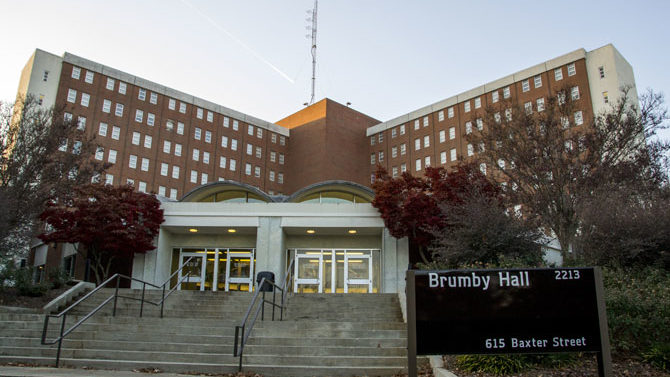Big changes are in the works for western parts of the UGA campus: three new buildings with a combined budget of just over $170 million. Much of the cost—$93 million—will be privately financed, with rental terms and partners to be set later.
The state Board of Regents, the governor-appointed board that oversees public higher education in the state, gave the initial go-ahead for one of the three projects at an Aug. 8 meeting and approved hiring design firms for two others the board had greenlighted in May. A new 565-bed dormitory for first-year students, an 1,100-space parking deck and a building housing an 800-seat dining hall, classrooms and a satellite University Health Center clinic will be going up in the next couple of years, all built atop what is now surface parking.
The upcoming UGA construction projects should alleviate, at least temporarily, chronic campus parking and housing shortages as the university grows its student body. They include a $74 million dorm for freshmen near Morris Hall, across Lumpkin Street from North Campus, and a $61 million “West Campus Dining, Learning and Wellness Center” sited on a parking lot at Cloverhurst and Finley streets, near Legion Pool. The third project, approved last week, is a $36 million, 1,100-space addition to the West Campus Parking Deck behind UGA’s Baxter Street dorms.
UGA proposes to pay for the deck addition entirely with surplus auxiliary services funds, but most of the financing for the dorm and dining hall/wellness center will be private money—$49 million invested in the $74 million cost of the dormitory, and $44 million for the $60.7 million dining/wellness center, according to documents submitted to the Board of Regents. UGA will put up $25 million in housing surplus funds for the dorm project and $16.7 in auxiliary surplus and reserve funds for the dining hall/wellness building.
Construction is already underway on another parking deck addition on a western edge of campus, an expansion of the Hull Street deck near the university’s new business school complex at the intersection of Baxter and Lumpkin streets. And UGA opened another new freshman dorm on the western campus, 525-bed Black-Diallo-Miller Hall, last fall.
UGA’s fall semester enrollment has grown by about 8% in the past five years, from 37,608 students in 2017 to 40,607 in 2022. Last year UGA began bumping up the size of its freshman class, from about 5,500 in 2019 to 6,250 last fall. Like many other large state flagship public universities with big-time football programs, UGA has steadily increased enrollment over the past decade, while smaller regional universities such as Valdosta State and the University of West Georgia have seen steep enrollment declines, reflecting nationwide trends.
UGA currently has an on-campus housing capacity of about 9,100 beds with nearly full occupancy, plus 1,705 more in fraternity and sorority houses.
A separate Regents vote ended, as of Sept. 1, a policy requiring presidents of University System of Georgia research institutions to live in school-owned housing. The USG’s four research institutions are Georgia Tech, Augusta University, Georgia State University and the University of Georgia. The vote came just weeks after UGA announced its high-maintenance antebellum presidential mansion on Prince Avenue would be going on the market.
The Regents housing vote closes the book on presidential housing requirements that stretch far back into the past, to a time when faculty as well as administrators had to live on campus. More recently, presidents of other public colleges were also required to live in university housing, as was the chancellor, now former Gov. Sonny Perdue. But the requirement for other university presidents was revoked decades ago, and Regents eliminated the requirement that the chancellor live in university housing in 2006.
UGA President Jere Morehead’s initial employment contract actually specified that he would reside in the UGA president’s mansion. Athens-Clarke County property records show that Morehead owns a house in Athens’ Bobbin Mill neighborhood.
Like what you just read? Support Flagpole by making a donation today. Every dollar you give helps fund our ongoing mission to provide Athens with quality, independent journalism.










